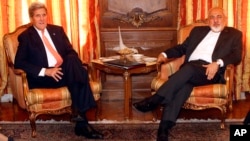The U.S. on Monday defended the terms of its tentative deal with Iran to restrain its nuclear program, saying it would include the "most extensive monitoring" the United States has ever negotiated with any country.
Wendy Sherman, the U.S. Under Secretary of State for Political Affairs, told a Jewish social justice group that the pact would give new protection to Israel by increasing the length of time Tehran would have to develop a nuclear weapon.
“Without such a agreement, Iran’s breakout time to get enough nuclear material for a weapon is two or three months - what it is right now. With this agreement, it will be one year - up to six times as long as it is now for at least 10 years.” She added that not completing a pact would leave the current shorter period in place and heighten Mideast tensions.
Israeli Prime Minister Benjamin Netanyahu has staunchly opposed the framework nuclear deal the United States and five other world powers negotiated with Iran, saying it would not stop Tehran from developing an atomic weapon that would threaten the Jewish state's existence. The negotiators are working toward completing a final deal by the end of June.
But Sherman pledged the U.S. to "unwavering support for Israel" and said the United States has "repeatedly rebuffed efforts to deligitimize" it.
"We understand Israel is in a tough neighborhood," she said.
Sherman said that if Tehran were to violate terms of the nuclear deal, the U.S. would have "every single option on the table" to confront it.
Her remarks came as Secretary of State John Kerry met with his Iranian counterpart for the first time since they agreed to a framework for a nuclear deal earlier this month.
Kerry and Iranian Foreign Minister Mohammad Javad Zarif sat down Monday in New York at the Upper East Side home of Iran's ambassador to the United Nations. Kerry and Zarif are both in New York to attend a United Nations conference on nuclear non-proliferation.
Their meeting comes as negotiators are trying to meet an end-of-June deadline for a comprehensive agreement that would put curbs on Iran's nuclear program in exchange for sanctions relief.
Negotiators from Iran and the world powers have given themselves until June 30 to complete the agreement. Iran has long insisted its nuclear activity is peaceful, and wants the full repeal of related sanctions that have hobbled its economy.
Netanyahu says the U.S. and its partners - Britain, China, France, Russia and Germany - are being too soft on Iran and would allow too much nuclear activity as they lift the sanctions.
President Barack Obama has defended the provisions of the framework deal, emphasizing that sanctions could be reimposed if Iran failed to uphold its part of the agreement.
Negotiators from Iran and the world powers have given themselves until June 30 to complete the agreement. Iran has long insisted its nuclear activity is peaceful, and wants the full repeal of related sanctions that have hobbled its economy.
In a rare appearance Saturday at a meeting of the Republican Jewish Coalition, former President George W. Bush expressed his criticism, questioning the feasibility of putting the sanctions back into place.
The U.S. Senate also is considering a bill that would allow Congress to review the terms of the agreement before lifting any of the sanctions imposed by U.S. lawmakers. It calls for Obama to certify every 90 days that Iran is complying. The president has said he would sign the measure.
VOA's Pamela Dockins contributed to this report from the U.S. State Department. Some information for this report from AP.





